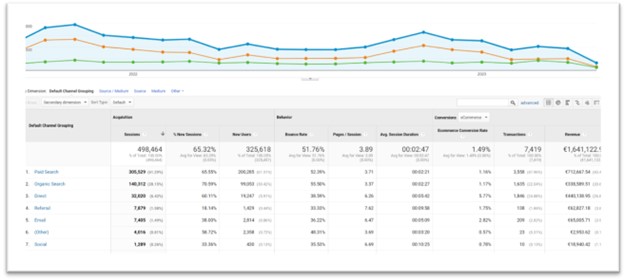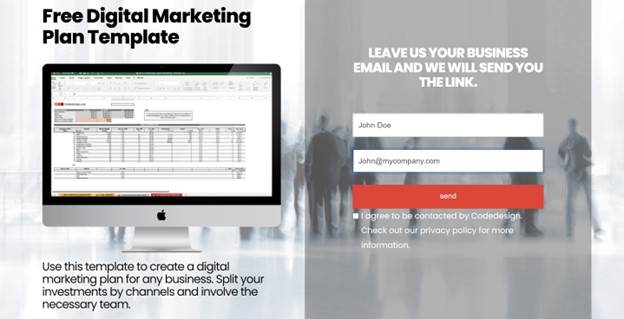11 min to read
Launching a small company is an exciting endeavor, but it requires careful planning and strategic thinking. A well-crafted business plan serves as the foundation for your business, providing a roadmap to success. This comprehensive blog post will explore the essential elements of creating a winning business plan for your small enterprise. From defining your vision to conducting market research, setting clear objectives, and outlining your financial projections, we will guide you through developing a comprehensive and compelling business plan.
Consider a business plan as a treasure map for your online sales venture. It's not just a document - it's a guide that shows you where you're starting, where you want to go, and the steps to get there. It's like your GPS! But instead of telling you to turn left in 300 feet, it's showing you how to go from an idea to a successful online business. And just like any journey, understanding why you're on it is crucial. That's why the first part of your business plan is to understand the importance of it. Imagine it like a compass pointing you toward the importance of planning, preparing, and predicting your way to success.

Defining Your Vision and Mission
Every successful business starts with a clear vision and mission. In this section, articulate your long-term vision for your small enterprise. What impact do you want to make in the market? What are your core values and guiding principles? Next, define your mission statement, which encapsulates the purpose and reason for your business's existence. It should be concise, inspirational, and aligned with your long-term vision.
Conducting Market Research
Market research is a crucial step in understanding your target market, competition, and industry trends. Start by identifying your target audience and their needs, preferences, and pain points. Conduct thorough research on your competitors, analyzing their strengths, weaknesses, and market positioning. Additionally, stay informed about the latest industry trends, technological advancements, and regulatory factors that may impact your business. This research will help you identify opportunities and devise effective strategies to differentiate your small enterprise.
Setting Clear Objectives and Goals
To achieve success, you need to set clear objectives and goals for your small enterprise. In this section, outline your short-term and long-term goals. Ensure they are specific, measurable, attainable, relevant, and time-bound (SMART). For example, you might set goals for revenue targets, customer acquisition, market share, or product development. Align these objectives with your overall vision and mission, and establish key performance indicators (KPIs) to track your progress.

Developing Your Marketing and Sales Strategy
A robust marketing and sales strategy is essential to attract and retain customers. Start by defining your unique value proposition and positioning in the market. Identify the most effective channels to reach your target audience, whether it's through digital marketing, social media, content marketing, or traditional advertising. Develop a comprehensive marketing plan that outlines your tactics, budgets, and timelines. Additionally, define your sales strategy, pricing structure, distribution channels, and customer relationship management approach.
Creating an Operational Plan
An operational plan outlines how your small enterprise will function daily. In this section, define your organizational structure, roles, and responsibilities of key team members. Detail your production or service delivery process, supply chain management, and quality control measures. Consider factors such as equipment, facilities, technology, and strategic partnerships required to support your operations. You can learn more about an operational plan to efficiently deliver company incorporation, accounting, and corporate compliance services. Establish milestones and timelines for key operational activities to ensure smooth execution.
Financial Projections and Funding Strategy
Financial projections demonstrate the viability and profitability of your small enterprise. Prepare detailed financial forecasts, including sales projections, revenue streams, costs, and expenses. Develop an understanding of your pricing model, profit margins, and cash flow requirements. Determine your break-even point and establish realistic milestones for achieving profitability. Additionally, outline your funding strategy, whether it involves self-financing, loans, grants, or seeking investors. Clearly articulate how the funds will be utilized and the potential stakeholders' expected return on investment.
Risk Assessment and Contingency Planning
No business plan is complete without a thorough assessment of potential risks and a contingency plan to mitigate them. Identify the potential risks and challenges your small enterprise may face, such as market fluctuations, regulatory changes, or operational disruptions. Evaluate each risk's probability and potential impact and outline strategies to minimize their effects. This could involve diversifying your revenue streams, developing alternative suppliers, or implementing robust cybersecurity measures. By addressing risks upfront and having contingency plans, you demonstrate your preparedness and ability to navigate challenges effectively.
Monitoring and Evaluation
Once your business plan is in motion, it's crucial to establish a system for monitoring and evaluating your progress. Define key performance indicators (KPIs) that align with your objectives and regularly track and analyze them. This allows you to make informed decisions, identify areas for improvement, and adapt your strategies as needed. Regularly reviewing and updating your business plan ensures that it remains relevant and responsive to market dynamics.
Creating a winning business plan is critical in launching and growing a successful small enterprise. It serves as a roadmap, guiding your decision-making, and providing a solid foundation for your operations. With a solid plan in place, you can confidently navigate the entrepreneurial journey and turn your small enterprise into a thriving and profitable venture.

Defining Your Business
Now, let's get to know your business. This is like your business's dating profile - it's where you say who you are and what you're all about. What's the big idea that's going to make you stand out in the crowded online sales scene?
First up, we have your mission and vision. Your mission is like your elevator pitch - it's what you do and why you do it. Your vision, on the other hand, is where you see your business in the future. It's like your business's dream job.
Next, let's talk about your products or services. This is the stuff you're selling. It's like your business's talent or superpower.
Finally, we have your unique selling proposition. This is what sets you apart from the crowd. Maybe you sell handmade, eco-friendly products that can't be found anywhere else. Or maybe you offer a super easy shopping experience with top-notch customer service. It's like your business's secret sauce that makes it irresistible to customers.
So there you go! By the end of these sections, you'll clearly understand why you need a business plan and a well-defined picture of your business. It's like the foundation for your online sales house, and now you're ready to start building the rest!
Market Analysis
Okay, so you've got a great business idea. Now, it's time to scout out the lay of the land. Your market analysis is like your spy mission to gather intel about the online sales landscape. You need to know the ins and outs of your industry, like how it's doing and where it's headed. It's like understanding the game's rules before you step onto the field.
Next, you've got to know your target audience. These are the folks you're selling to. Picture your ideal customer – what they like, what they don't like, what they need, and what makes them tick. It's like sketching your best friend – the better you know them, the more accurate your sketch will be.
Lastly, you need to check out your competition. It's like sizing up the other players on the field. What are they doing right? What could they improve? And most importantly, how can you do things differently or better?
Several online tools can help you conduct a market analysis for free. Here are some of the top picks:
- Google Trends: This tool allows you to see how often a term is searched for. You can compare multiple terms to see relative popularity, see regional interest, and identify trends over time.
- SimilarWeb: A tool that provides insights about any website's traffic, rank, and engagement, allowing you to gauge your competitors' performance and understand your target market better.
- Social Mention: This tool helps you track what people say about your brand, products, or competitors across social media platforms and blogs.
- SurveyMonkey: While not a traditional market analysis tool, SurveyMonkey lets you directly ask your target market or audience about their preferences, creating primary data that is crucial for your business.
- BuzzSumo: This tool helps you see what content is most popular by topic or on any website, helping you understand what's currently trending in your market or industry.
- SEMRush: It has a limited free version, but it's a powerful tool for keyword analysis, SEO, and competitive research.
- Facebook Audience Insights: This tool provides information about two groups of people—people connected to your Page and people on Facebook—so you can create content that resonates and easily find more people like the ones in your current audience.
Remember, while these tools can provide valuable insights, they're just one piece of the puzzle. Reach our to codedesign team; we are happy to cross-reference the data from multiple sources to get a well-rounded view of your market.
Marketing and Sales Strategy
Now, let's talk about how to attract those customers and make those sales. This is where you map out your game plan. Your online marketing strategies are the plays you'll run to get the word out about your business. This could be anything from a killer social media campaign to an SEO strategy that gets your website at the top of search engine results.
But attracting customers is only half the battle. You also need to plan how you will close the deal and make the sale. And once you've made a sale, you've got to keep that customer coming back for more. It's like a game of catch – you've got to throw the ball (attract the customer), catch it (make the sale), and then keep the game going (retain the customer).
Of couse there are numerous online platforms, but as a digital marketing agency there are some that are instrumental in shaping sales strategies:
1. Google Ads: This platform allows you to run ads on the Google search engine and its associated properties. With its wide reach and powerful targeting options, Google Ads can be a key part of your online advertising strategy.
2. Facebook / Instagram Ads: With its vast user base, Facebook is a platform that can't be ignored. Its advertising tools allow for detailed targeting based on a user's interests, behavior, and demographic details.
3. HubSpot: This is an all-in-one marketing, sales, and service platform. It's great for content management, SEO, email marketing, social media, and customer relationship management. HubSpot also offers a wealth of resources for marketing and sales strategy.
4. LinkedIn: Particularly for our B2B clients, LinkedIn can be a powerful platform for marketing and sales. From advertising to prospecting to thought leadership, you can pursue a wide range of strategies.
5. Mailchimp: Known for its email marketing capabilities, Mailchimp has now expanded into an all-in-one marketing platform. It's a great tool for managing and talking to your customers, clients, and other interested parties.
These platforms are often combined to create a robust, multi-channel marketing and sales strategy. Each one has its strengths and can reach different sections of your target market, so it's worth considering a mix of these platforms based on your specific needs and goals.

Operations and Management
Next up, we've got operations and management. This is the behind-the-scenes stuff that keeps your business running smoothly. It's like the stage crew for a play – they may not be in the spotlight, but without them, the show couldn't go on.
First, you've got to choose your e-commerce platform. This is like picking the venue for your play. It needs to be somewhere that suits your needs and will help you put on a great show.
Then, you've got to figure out your supply chain management. This is how you get your products from A to B. It's like planning the route for your road trip – you've got to know where you're starting, where you're stopping along the way, and how you're getting to your final destination.
Finally, there's your team structure and responsibilities. This is who does what in your business. It's like assigning roles in a play – everyone needs to know their part and how they contribute to the overall performance.
For example, we use specific tools to track time and accountability as a digital marketing agency. Because a lot of our team is remotely working from different regions as Portugal, Brasil, US, UK and Singapore we need to make sure everyone is in the same page all the time. Addicionally clients used different operational models that we integrate with. Here are some tools we've tried in the past (some we still use, others not any more).
- Asana: Asana is a project management tool that helps teams orchestrate their work, from small projects to strategic initiatives. It can be used to create and assign tasks, set deadlines, share files, and more.
- Slack: This communication tool brings all your team's conversations, files, and tools in a single place. It's especially useful for agencies with remote or distributed teams.
- Trello: Another project management tool, Trello's card and board system is particularly well-suited to visual thinkers. It's great for tracking the progress of different projects and tasks.
- Google Workspace: These tools includes Gmail, Google Docs, Google Sheets, Google Slides, and Google Drive. These tools are great for collaboration, document sharing, and storage.
- HubSpot: While known for its marketing and sales tools, HubSpot also offers a Service Hub that includes customer service tools, a knowledge base, and more.
- Zapier: Zapier is an online automation tool that connects your favorite apps, such as Gmail, Slack, Mailchimp, and more. You can automate repetitive tasks without coding or relying on developers to build the integration.
- Harvest or Toggl: Both tools are time-tracking software that can help digital agencies manage and bill for their time.
- Quickbooks: This is a comprehensive tool for handling all of your accounting needs, including invoicing, bill payment, and payroll.
Each of these tools brings something unique to the table, so it's worth exploring each to see which ones best meet the needs of your digital agency.
Financial Projections
Last but not least, we've got financial projections. This is the nitty-gritty money stuff. It's like your business's report card – it shows where you're doing well and where you need to improve.
First, you need to figure out your startup costs. This is how much it's going to cost to get your business off the ground. It's like the price tag on a new car – you've got to know what it is before you can start saving up.
Next, you've got to project your revenue and sales. This is how much money you expect to make. It's like forecasting the weather – you can't predict it with 100% accuracy, but you can make an educated guess based on the information you have.
Finally, there's your break-even analysis. This is when your business stops costing you money and starts making you money. It's like reaching the top of a mountain – it's the point where you stop climbing and start enjoying the view.
These financial projections might seem a bit daunting, but they're super important. They help you understand your business's financial health and plan for the future. It's like a fitness test for your business – it shows you where you're strong, where you need to improve, and how to get your business in tip-top shape.
So, by the end of these sections, you'll have a solid understanding of your market, a game plan for attracting and retaining customers, a well-oiled operations machine, and a financial game plan for your business. You're well on your way to creating a top-notch business plan for your online sales venture.
Codedesign is a Data-Driven Marketing Agency.
As experts in digital marketing, we know that we must be up to date with all the information and tactics to provide the best service to our clients. Technology has come to make our lives easier. In the same way, we, as an agency, seek to make your job easier by taking care of all digital marketing duties so your business can reach its most significant potential.
Data and analytics are our compasses to make wiser decisions within your niche, which we combine with our knowledge and expertise in digital marketing management to boost your results. If you want to know more about data or more advice on the direction of your business online, contact us at this time.

About Bruno GavinoBruno Gavino is the CEO and partner of Codedesign, a digital marketing agency with a strong international presence. Based in Lisbon, Portugal, with offices in Boston, Singapore, and Manchester (UK) Codedesign has been recognized as one of the top interactive agencies and eCommerce agencies. Awarded Top B2B Company in Europe and Top B2C company in retail, Codedesign aims to foster personal relationships with clients and create a positive work environment for its team. He emphasizes the need for digital agencies to focus on data optimization and performance to meet the increasingly results-driven demands of clients. His experience in digital marketing, combined with a unique background that includes engineering and data, contributes to his effective and multifaceted leadership style. |

About CodedesignCodedesign is a digital marketing agency with a strong multicultural and international presence, offering expert services in digital marketing. Our digital agency in Lisbon, Boston, and Manchester enables us to provide market-ready strategies that suit a wide range of clients across the globe (both B2B and B2C). We specialize in creating impactful online experiences, focusing on making your digital presence strong and efficient. Our approach is straightforward and effective, ensuring that every client receives a personalized service that truly meets their needs. Our digital agency is committed to using the latest data and technology to help your business stand out. Whether you're looking to increase your online visibility, connect better with your audience, get more leads, or grow your online sales. For more information, read our Digital Strategy Blog or to start your journey with us, please feel free to contact us. |
CodeDesign is leading:
- Digital Agency
- Digital Marketing Agency
- Digital Ecommerce Agency
- Amazon Marketing Agency



Add comment ×